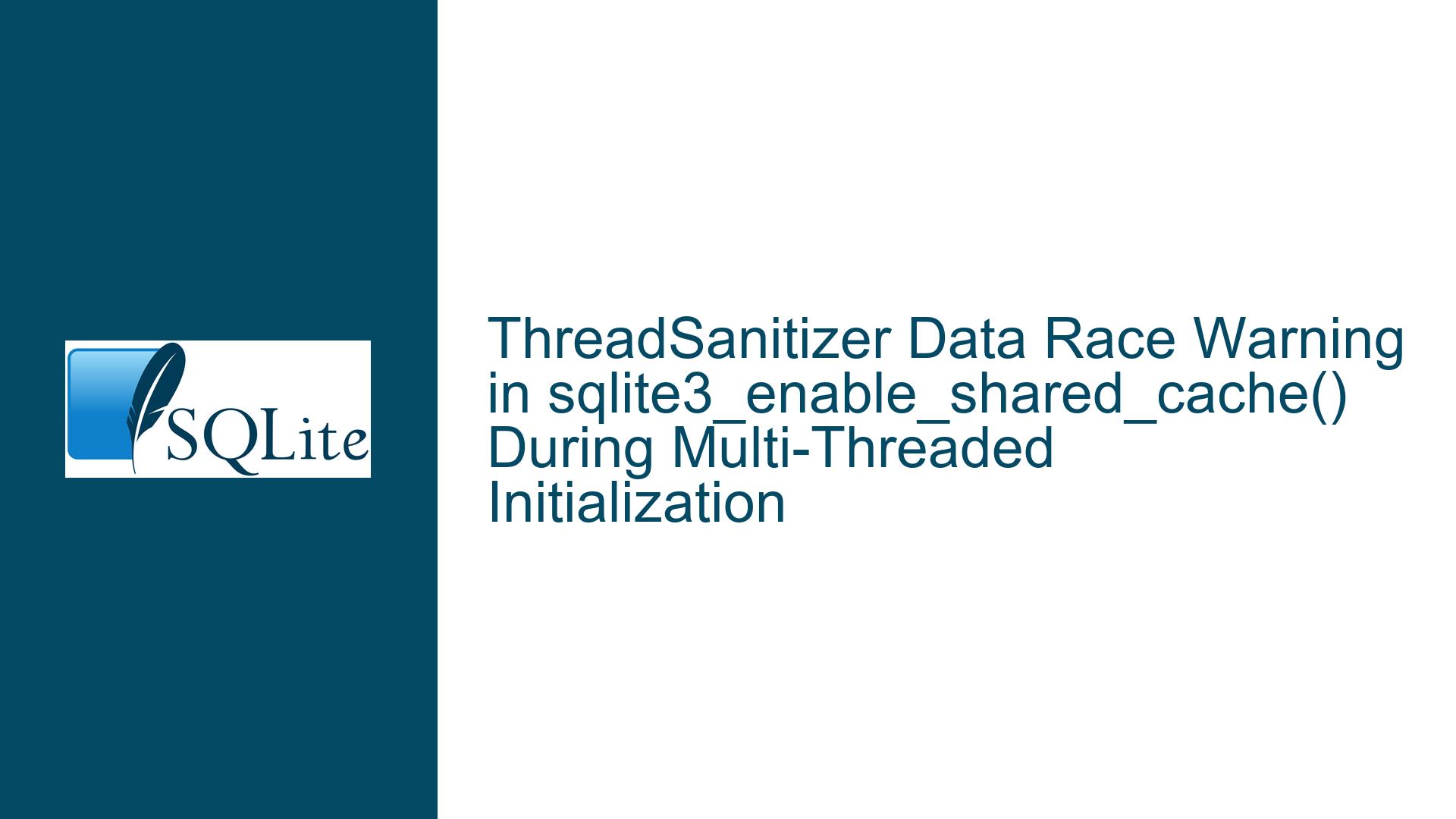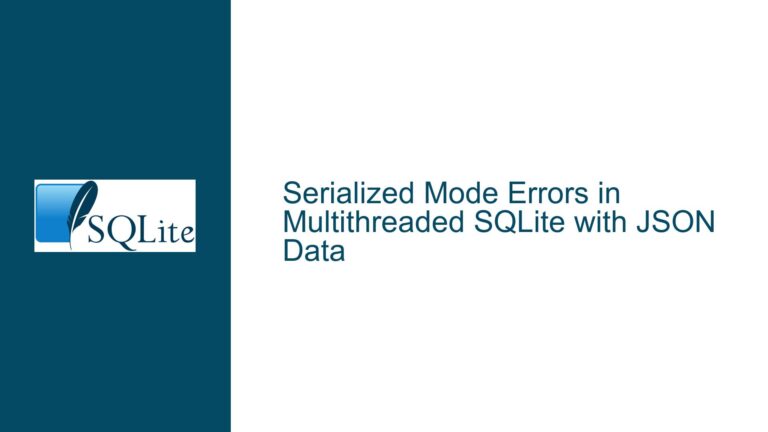ThreadSanitizer Data Race Warning in sqlite3_enable_shared_cache() During Multi-Threaded Initialization
Global Configuration Write Collision in Multi-Threaded SQLite Initialization
Issue Characteristics and Technical Context
The core problem manifests as a ThreadSanitizer (TSan) warning when concurrently invoking sqlite3_enable_shared_cache(1) across multiple threads. This occurs due to unsynchronized writes to SQLite’s global configuration structure (sqlite3Config), specifically the sharedCacheEnabled field. The race condition arises when two or more threads attempt to modify this global state simultaneously without mutual exclusion mechanisms.
At the machine code level, the operation appears as sequential stores to a memory location:
mov DWORD PTR [rip+0x706dac], 1 ; Hypothetical x86_64 assembly
While x86 architectures guarantee atomicity for aligned 32-bit memory writes, TSan operates at the C/C++ abstract machine level where such operations aren’t formally recognized as atomic unless explicitly declared with C11 atomic types or synchronization primitives. The SQLite codebase implements sharedCacheEnabled as a plain int member of the global sqlite3Config structure, leading to TSan’s data race detection even when hardware-level atomicity exists.
The conflict occurs through three primary vectors:
- Global State Contention: Multiple threads accessing the shared
sqlite3Configstructure - Write-Write Hazard: Concurrent modification of
sharedCacheEnabledwithout locking - Memory Visibility Guarantees: Lack of formal memory barrier instructions to ensure cache coherency
This situation creates a paradoxical scenario where the code may function correctly on specific hardware architectures (x86, ARMv8+) due to inherent memory model characteristics, while still triggering valid TSan warnings at the language level. The SQLite documentation caveat about thread safety being dependent on 32-bit atomic writes directly interacts with this behavior, creating platform-specific reliability expectations.
Architectural Constraints and Concurrency Model Mismatches
Three fundamental factors contribute to this race condition warning:
1. SQLite’s Global Configuration Locking Strategy
SQLite employs a granular locking strategy optimized for connection-level parallelism rather than global configuration changes. The sqlite3_enable_shared_cache() function modifies global state without internal mutex protection based on the assumption that:
- Configuration occurs during single-threaded initialization
- Platforms with atomic 32-bit writes can safely handle rare concurrent modifications
This design choice prioritizes performance over formal thread safety guarantees for configuration changes, assuming developers will either:
a) Initialize settings before spawning threads
b) Accept responsibility for platform-specific atomicity
2. ThreadSanitizer’s Conservative Data Race Detection
TSan implements a hybrid dynamic analysis approach that:
- Tracks memory accesses through compiler instrumentation
- Maintains vector clocks for happens-before relationships
- Flags any unsynchronized concurrent memory accesses
It cannot automatically recognize platform-specific atomic operations unless they’re annotated with standard synchronization primitives (mutexes, atomics). The tool’s philosophy prioritizes false positives over missed races, making it incompatible with SQLite’s hardware-dependent thread safety claims for this particular function.
3. C/C++ Memory Model Limitations
The C11/C++11 memory models explicitly require either:
- Atomic types with specified memory orders
- Mutex-protected accesses
- Volatile semantics (implementation-defined)
SQLite’s use of a plain int for sharedCacheEnabled falls outside these sanctioned synchronization methods, creating formal undefined behavior under the language standard. While many compilers and architectures tolerate this through implementation-defined behavior, analysis tools like TSan must adhere strictly to language standards.
Resolution Pathways and Mitigation Techniques
1. Architectural Reconfiguration of Shared Cache Initialization
Single-Threaded Initialization Pattern
Enforce configuration before thread creation:
int main() {
sqlite3_enable_shared_cache(1); // Main thread initialization
std::thread t1(&Worker);
std::thread t2(&Worker);
t1.join();
t2.join();
return 0;
}
This approach eliminates concurrency by leveraging the program’s startup phase for configuration. SQLite connections created in worker threads will inherit the shared cache setting.
Compile-Time Configuration
Modify SQLite’s compile flags to enable shared cache permanently:
-DSQLITE_ENABLE_SHARED_CACHE=1
This bypasses runtime configuration entirely, embedding the setting directly into the library binary.
2. Synchronization Wrappers for Runtime Configuration
Mutex-Guarded Configuration
Implement a global mutex for configuration functions:
std::mutex sqlite_config_mutex;
void ThreadSafeEnableSharedCache(int enable) {
std::lock_guard<std::mutex> guard(sqlite_config_mutex);
sqlite3_enable_shared_cache(enable);
}
While introducing synchronization overhead, this guarantees atomic access across threads. The mutex ensures sequential execution of configuration changes.
Double-Checked Locking Optimization
Reduce mutex contention through lazy initialization:
std::atomic<bool> config_initialized{false};
std::mutex config_mutex;
void InitSharedCacheOnce(int enable) {
if (!config_initialized.load(std::memory_order_acquire)) {
std::lock_guard<std::mutex> lock(config_mutex);
if (!config_initialized.load(std::memory_order_relaxed)) {
sqlite3_enable_shared_cache(enable);
config_initialized.store(true, std::memory_order_release);
}
}
}
This pattern minimizes lock contention after initial configuration while maintaining thread safety.
3. Platform-Specific Atomic Operations
C11 Atomic Types Patch
Modify SQLite’s internal definition:
// In sqliteInt.h
typedef struct SQLiteGlobalConfig {
// ...
_Atomic int sharedCacheEnabled;
// ...
} sqlite3Config;
Requires C11-compatible compiler and alters SQLite’s public interface. May introduce compatibility issues with older toolchains.
Memory Barrier Enforcement
Insert compiler barriers around accesses:
void sqlite3_enable_shared_cache(int enable) {
sqlite3Config.sharedCacheEnabled = enable;
__atomic_signal_fence(__ATOMIC_SEQ_CST); // GCC/Clang specific
}
This informs TSan about the atomic nature of the operation without changing data types. Highly compiler-dependent and not standards-compliant.
4. ThreadSanitizer Suppression Techniques
Function-Level Suppression
Create a TSan suppression file:
race:sqlite3_enable_shared_cache
Execute with:
TSAN_OPTIONS="suppressions=tsan.supp" ./warn_test
Tells TSan to ignore races in the specified function. Appropriate for development environments but masks potential real issues.
Compiler-Specific Annotations
Use TSan’s suppression macros:
void Init() {
ANNOTATE_IGNORE_WRITES_BEGIN();
sqlite3_enable_shared_cache(1);
ANNOTATE_IGNORE_WRITES_END();
// ...
}
Requires including TSan’s header (#include <sanitizer/tsan_interface.h>) and compiler support.
5. SQLite Source Code Modifications
Atomic API Integration
Replace direct writes with SQLite’s internal atomic operations:
void sqlite3_enable_shared_cache(int enable) {
sqlite3MemoryBarrier();
sqlite3Config.sharedCacheEnabled = enable;
sqlite3MemoryBarrier();
}
Leverages SQLite’s cross-platform memory barriers (sqlite3MemoryBarrier()) to enforce visibility. Requires modifying SQLite’s source but maintains compatibility.
Configuration Mutex in SQLite
Introduce a global configuration mutex within SQLite:
static sqlite3_mutex *configMutex = 0;
void sqlite3_enable_shared_cache(int enable) {
if( !configMutex ) configMutex = sqlite3MutexAlloc(SQLITE_MUTEX_STATIC_MASTER);
sqlite3_mutex_enter(configMutex);
sqlite3Config.sharedCacheEnabled = enable;
sqlite3_mutex_leave(configMutex);
}
Utilizes SQLite’s internal mutex system for thread safety. Adds synchronization overhead but aligns with SQLite’s existing concurrency model.
6. Documentation-Driven Development Practices
Explicit Initialization Protocols
Formalize SQLite configuration in project guidelines:
- All global configuration functions must be called from main thread
- Configuration locks must be held before creating database connections
- Runtime configuration changes prohibited after initialization
Platform Requirement Specifications
Update build documentation to specify:
- 32-bit integer atomic write requirements
- Supported compiler versions with known atomic behavior
- TSan usage guidelines for SQLite configuration
7. Alternative Shared Cache Management
Per-Connection Cache Configuration
Bypass global configuration by specifying cache mode at connection open:
sqlite3* db;
sqlite3_open_v2("database.db", &db, SQLITE_OPEN_READWRITE | SQLITE_OPEN_SHAREDCACHE, NULL);
Explicit per-connection flags avoid global state modification entirely.
Environment Variable Configuration
Set shared cache mode through environment variables:
setenv("SQLITE_SHARED_CACHE", "1", 1);
// Before any SQLite API calls
Allows configuration without function calls, initialized during SQLite’s internal environment processing.
Conclusion and Strategic Recommendations
For production systems targeting x86/ARM64 architectures without TSan, the original code may function safely despite the race condition warning. However, for strict standards compliance and toolchain compatibility:
- Adopt Single-Threaded Initialization: Call
sqlite3_enable_shared_cache()before thread creation - Use Per-Connection Flags: Prefer
SQLITE_OPEN_SHAREDCACHEover global configuration - Implement Wrapper Functions: Add synchronization if runtime configuration is unavoidable
- Document Platform Expectations: Clearly specify atomic write requirements for team awareness
For codebases requiring TSan cleanliness without modifying SQLite:
- Isolate Configuration: Initialize SQLite in dedicated pre-thread phase
- Suppress False Positives: Use TSan annotations/suppressions judiciously
- Upgrade SQLite Versions: Monitor official SQLite releases for concurrency improvements
This comprehensive approach balances runtime efficiency, toolchain compatibility, and long-term maintainability while respecting SQLite’s design philosophy and the realities of modern static analysis tools.






